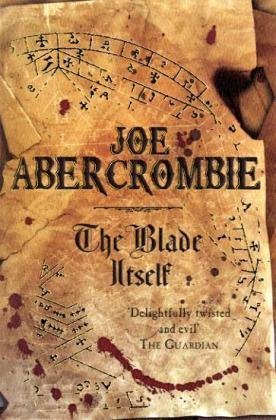Quite simply Joe Abercrombie is my favourite author and has been for some years. I first encountered his offerings when the Fair One brought home a book she had seen lying about in Waterstones entitled The Blade Itself.
I took a quick look at the blurb and decided straight away this was more my kind of thing than hers:
- Science Fantasy – check.
- Characters with silly names hailing from ridiculous sounding locations – check.
- Not a standalone book, its part of a trilogy – check.
The Fair one was having none of this and pointed out the book also had:
- A somewhat dark nature (how many books start with a ‘hero ‘ who is a torturer?) – check.
- A definite dark sense of humour throughout – check.
- No ‘cute’ races like hobbits, kender, faeries or windlings. So it can’t possibly be fantasy – check.
We agreed to share the book. This was back in 2006, we haven’t missed a book he’s written since then. If you look closely at the picture above you will see the quote from The Guardian – “Delightfully twisted and evil.” That sums it up pretty well. The traits of all Abercrombie’s books include a dark humour throughout, a wonderful turn of phrase and characters with as much (if not more) darkness to them as they have redeeming qualities. You won’t find a Legolas in any of his books, but certainly a few characters that would give the Lannisters a run for their gold.
I’d suggest you buy them and read them in order as the characters from one book tend to appear in later ones.
Abercrombie is changing things about a bit for his next book – Young adult fiction. ‘Half A King’ already written, comes out in July. This should be an interesting departure for him. He’s already addressed fan concerns on his forum that just because its Young Adult doesn’t mean it can’t be dark and twisted too. I’ll be curious to see how that goes.
You can find Joe Abercrombie on Twitter under @LordGrimdark and that’s well worth following. Especially for the 1-star reviews of his books he tweets excerpts from e.g. Today’s 1-star: ‘This book killed a small part of my inner child.’ If you have an inner child then keep them the fuck away from an Abercrombie book, go give them some fairy tales or similar. Unlike a lot of authors Abercrombie doesn’t just use social media to push his products but he opines on all sorts of everyday stuff, usually with good comedic value. His blog is good value too, with lots of variety – games, TV, whiskey deathmatches and even the odd bit about what he’s writing.
If I still haven’t convinced you to get some of his books then all I can say is think of George R R Martin with more (dark) humour and a plot that knows where its going. If you like Game of Thrones, then you can’t fail to like this too.



